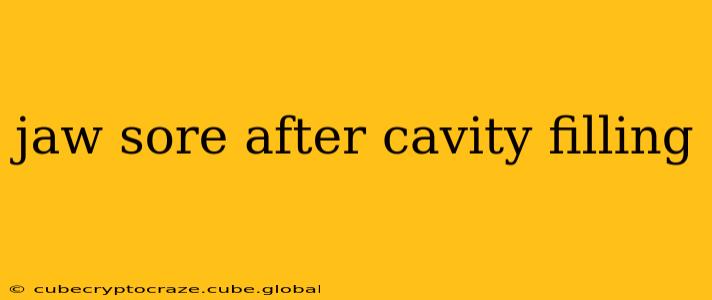A sore jaw after a cavity filling is a common experience, often stemming from the procedure itself or underlying issues. While usually temporary, understanding the potential causes and how to manage discomfort is crucial for a speedy recovery. This comprehensive guide explores the reasons behind jaw soreness post-filling, effective relief methods, and when professional dental attention is necessary.
Why Does My Jaw Hurt After a Filling?
The discomfort you’re feeling is likely due to one or more of these factors:
-
Inflammation and Irritation: The filling procedure involves drilling and manipulating the tooth, potentially causing minor trauma and inflammation to the surrounding tissues. This inflammation can radiate to the jaw, causing soreness and tenderness.
-
Muscle Strain: During the procedure, you might unconsciously tense your jaw muscles. This tension can persist after the filling, leading to soreness and stiffness.
-
Bite Adjustment: Sometimes, a new filling can alter your bite, leading to misalignment and discomfort in your jaw joint (temporomandibular joint or TMJ). This is more likely if the filling is large or significantly changes the tooth's height.
-
Infection: While less common, a post-filling infection can cause significant jaw pain. Symptoms may include severe pain, swelling, redness, and fever. This requires immediate dental attention.
-
Existing TMJ Disorder: If you already suffer from temporomandibular joint disorder (TMJ), a dental procedure like a filling might exacerbate existing pain and discomfort.
How Long Does Jaw Soreness After a Filling Last?
The duration of jaw soreness varies, typically lasting from a few days to a couple of weeks. Mild discomfort that gradually improves is usually nothing to worry about. However, persistent or worsening pain warrants a visit to your dentist.
What Can I Do to Relieve Jaw Pain After a Filling?
Several home remedies can provide relief:
-
Over-the-counter pain relievers: Ibuprofen (Advil, Motrin) or acetaminophen (Tylenol) can help manage pain and reduce inflammation. Always follow the dosage instructions on the packaging.
-
Ice Packs: Applying an ice pack to the affected area for 15-20 minutes at a time can help reduce swelling and numb the pain. Never apply ice directly to the skin; use a thin cloth as a barrier.
-
Warm Compresses: After the initial 24-48 hours, warm compresses can help relax tense jaw muscles and improve blood flow.
-
Gentle Massage: Gently massaging your jaw muscles can help relieve tension and improve circulation.
-
Soft Food Diet: Stick to soft foods that require minimal chewing to minimize stress on your jaw.
Is Jaw Pain After a Filling Normal?
Some level of discomfort is considered normal immediately following a filling. However, severe pain, swelling, or pain that lasts longer than a couple of weeks is not.
When Should I See a Dentist About Jaw Pain After a Filling?
Consult your dentist immediately if you experience:
- Severe or persistent pain: Pain that doesn't respond to over-the-counter pain relievers or home remedies.
- Swelling: Significant swelling around the affected tooth or jaw.
- Redness or warmth: Signs of infection.
- Fever: A high temperature.
- Difficulty opening your mouth: Limited range of motion in your jaw.
Can a Filling Cause TMJ Problems?
While not always the case, a poorly placed filling or one that significantly alters your bite can contribute to or worsen existing TMJ problems. If you suspect your filling is causing or exacerbating TMJ issues, see your dentist for an evaluation.
How Can I Prevent Jaw Soreness After a Filling?
While you can't completely eliminate the risk, here are some preventative measures:
- Communicate with your dentist: Discuss any concerns you have before the procedure.
- Relax during the procedure: Try relaxation techniques to minimize jaw tension.
- Follow your dentist's post-procedure instructions carefully.
This information is intended for general knowledge and informational purposes only, and does not constitute medical advice. Always consult with a qualified dental professional for any health concerns or before making any decisions related to your health or treatment.
